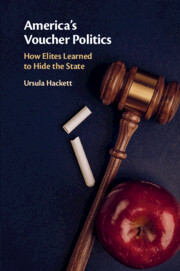Book contents
- America’s Voucher Politics
- America’s Voucher Politics
- Copyright page
- Contents
- Figures
- Tables
- Acknowledgments
- Abbreviations
- Introduction
- 1 America’s Foundational Identity Struggles
- 2 Two Dimensions of Attenuated Governance
- 3 The Racial Struggle
- 4 The Religious Struggle
- 5 The Public–Private Struggle
- 6 Tax Credit Scholarships in an Era of Republican Dominance
- 7 Education Savings Accounts and Controversies Beyond
- Conclusion
- Appendix
- References
- Index
6 - Tax Credit Scholarships in an Era of Republican Dominance
Published online by Cambridge University Press: 20 April 2020
- America’s Voucher Politics
- America’s Voucher Politics
- Copyright page
- Contents
- Figures
- Tables
- Acknowledgments
- Abbreviations
- Introduction
- 1 America’s Foundational Identity Struggles
- 2 Two Dimensions of Attenuated Governance
- 3 The Racial Struggle
- 4 The Religious Struggle
- 5 The Public–Private Struggle
- 6 Tax Credit Scholarships in an Era of Republican Dominance
- 7 Education Savings Accounts and Controversies Beyond
- Conclusion
- Appendix
- References
- Index
Summary
The sluggish growth of vouchers into the first decade of the twenty-first century prompted voucher supporters to reevaluate their strategy. Ballot initiatives proved fruitless, so supporters switched to state legislatures and sought to distance the state from private schools by funding vouchers through tax credits rather than direct appropriation. The full fruits of attenuated governance matured with Republican victories during Barack Obama’s presidency. This chapter shows that the doubly distanced tax credit form enabled individualist and accommodationist forces to divert public funds to private religious institutions without appearing to do so. Due to the lingering importance of communitarian public schooling and secularist approaches to church–state relations among the nation’s many judges, doubly distanced policies were safest. Statistical analysis demonstrates that they were, and are, least likely to be challenged in court or struck down as unconstitutional. Attenuation is a powerful strategy for rival forces in America’s foundational struggles because it enables policymakers to achieve their goals obliquely. The link between state and legally controversial policy outputs is plausibly deniable in crucial venues of policy contestation, provided that elites follow the attenuation strategy consistently.
Keywords
- Type
- Chapter
- Information
- America's Voucher PoliticsHow Elites Learned to Hide the State, pp. 137 - 164Publisher: Cambridge University PressPrint publication year: 2020

